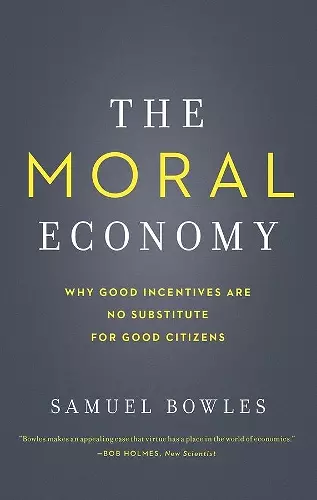The Moral Economy
Why Good Incentives Are No Substitute for Good Citizens
Format:Paperback
Publisher:Yale University Press
Published:24th Oct '17
Should be back in stock very soon

Why do policies and business practices that ignore the moral and generous side of human nature often fail?
Should the idea of economic man—the amoral and self-interested Homo economicus—determine how we expect people to respond to monetary rewards, punishments, and other incentives? Samuel Bowles answers with a resounding “no.” Policies that follow from this paradigm, he shows, may “crowd out” ethical and generous motives and thus backfire.
But incentives per se are not really the culprit. Bowles shows that crowding out occurs when the message conveyed by fines and rewards is that self-interest is expected, that the employer thinks the workforce is lazy, or that the citizen cannot otherwise be trusted to contribute to the public good. Using historical and recent case studies as well as behavioral experiments, Bowles shows how well-designed incentives can crowd in the civic motives on which good governance depends.
"In his tightly argued and illuminating book, Bowles makes the case that appeals made to our self-interest can undercut instinctive moral impulses; and that when these impulses are weakened crucial institutions work sub-optimally, if not at all."—Robert Armstrong, Financial Times
"Bowles makes an appealing case that virtue has a place in the world of economics . . . adds to a tide of research (such as the work of economist Elinor Ostrom and evolutionary biologist David Sloan Wilson) showing that selfishness is not the only human virtue in the real world."—Bob Holmes, New Scientist
“A welcome alternative. . . Bowles persuasively argues that when economists take as given (and thus plan for) a world of utility-maximising agents, they actually help create such a world.”
—Rebecca L. Spang, Times Literary Supplement
Won an Honorable Mention for the 2017 Robert Lane Award given by the Organized Political Sections of the APSA
"The Moral Economy plows new ground in exploring how the actions we take are motivated by their meaning. Samuel Bowles is proposing a paradigm shift in how we think about our lives and about economics."—George Akerlof, Nobel Laureate in Economics
"The Moral Economy convincingly shows that economic incentives and legal constraints alone will not produce a flourishing society because good – morally motivated – people are indispensable. A thought-provoking work!"—Ernst Fehr, Professor of Economics at the University of Zurich
"The Moral Economy is a brilliant book. Rarely have such big ideas been communicated in such a compact package. This book should change the way political leaders, policy makers, and social scientists of all stripes do their work and understand the work that they do."—Barry Schwartz, author of Practical Wisdom and Why We Work
"In this wonderful book, Sam Bowles explores—with intellectual breadth and analytical acuity—the importance of altruism and a sense of fairness in creating and sustaining decent societies. His prose is lucid, arguments compelling, and conclusions important. This is social science at its very best."—Joshua Cohen, Apple University
"Sam Bowles is a visionary thinker who has done more than anyone else I know to unite the social sciences. In this superb book his combination of wisdom and rigor shines through, offering important lessons for anyone who hopes to motivate, govern, or even inspire actual humans."—Joshua Greene, author of Moral Tribes and director of the Moral Cognition Lab, Harvard University
ISBN: 9780300230512
Dimensions: unknown
Weight: 363g
288 pages